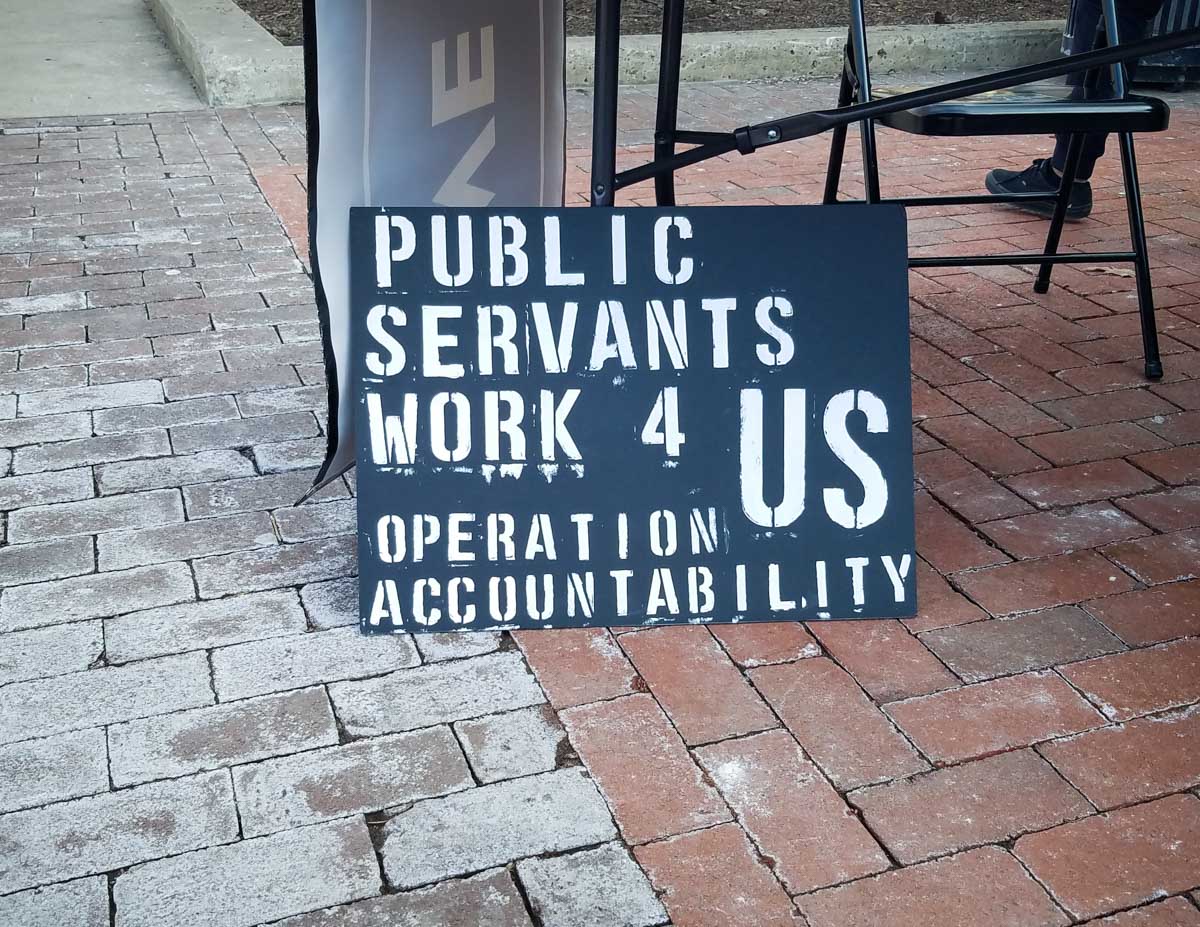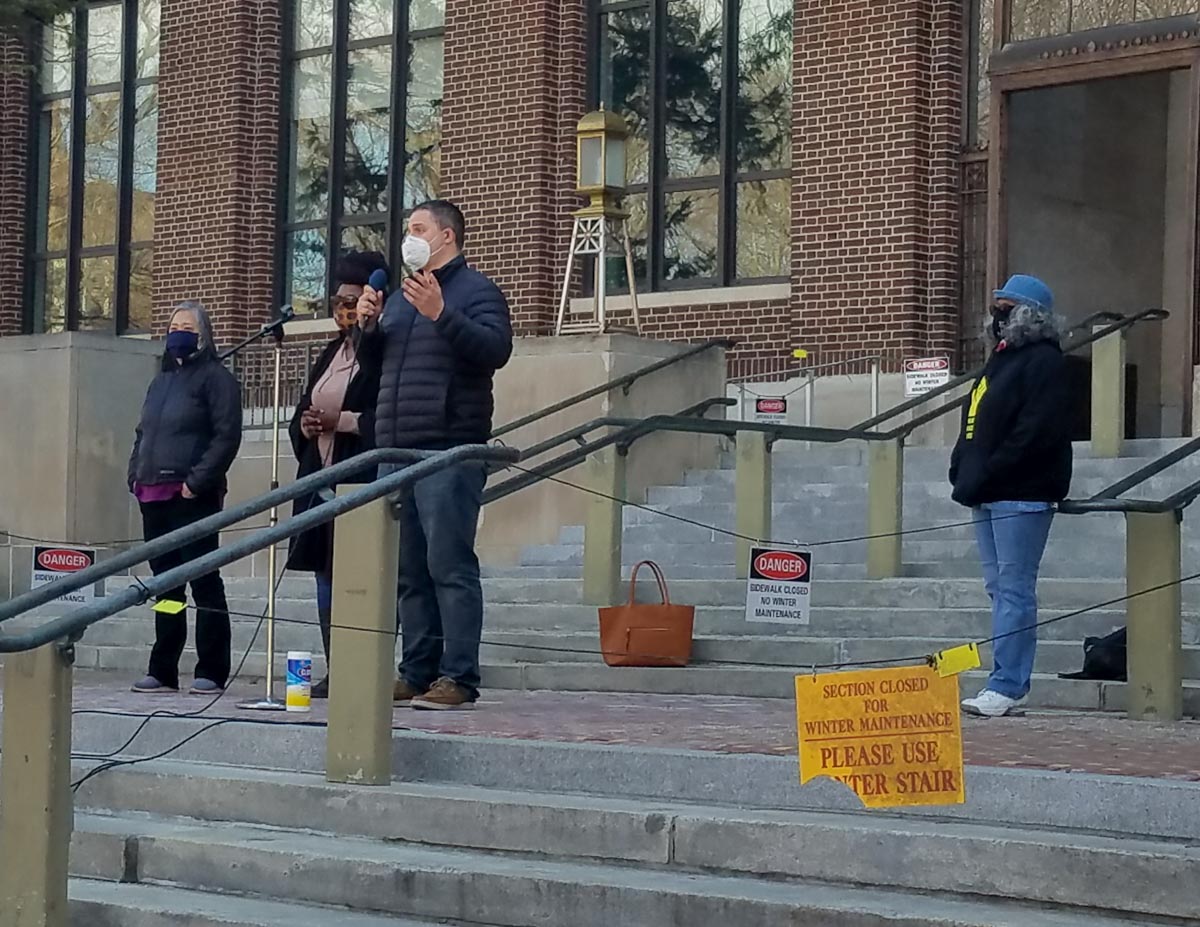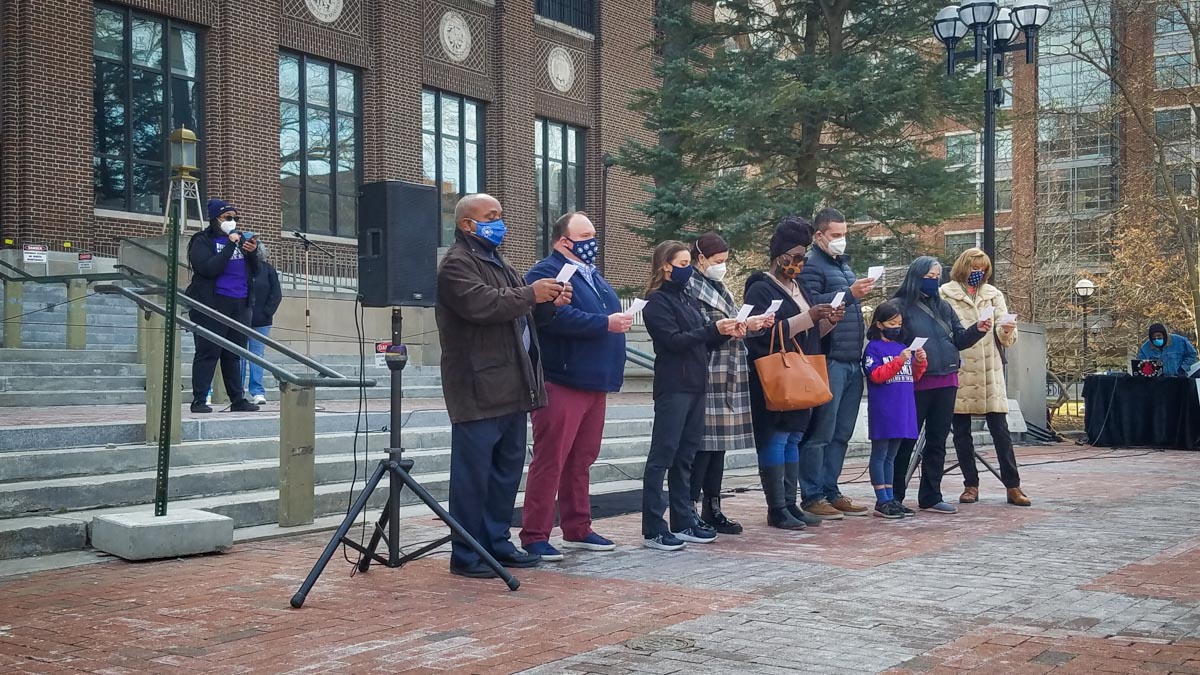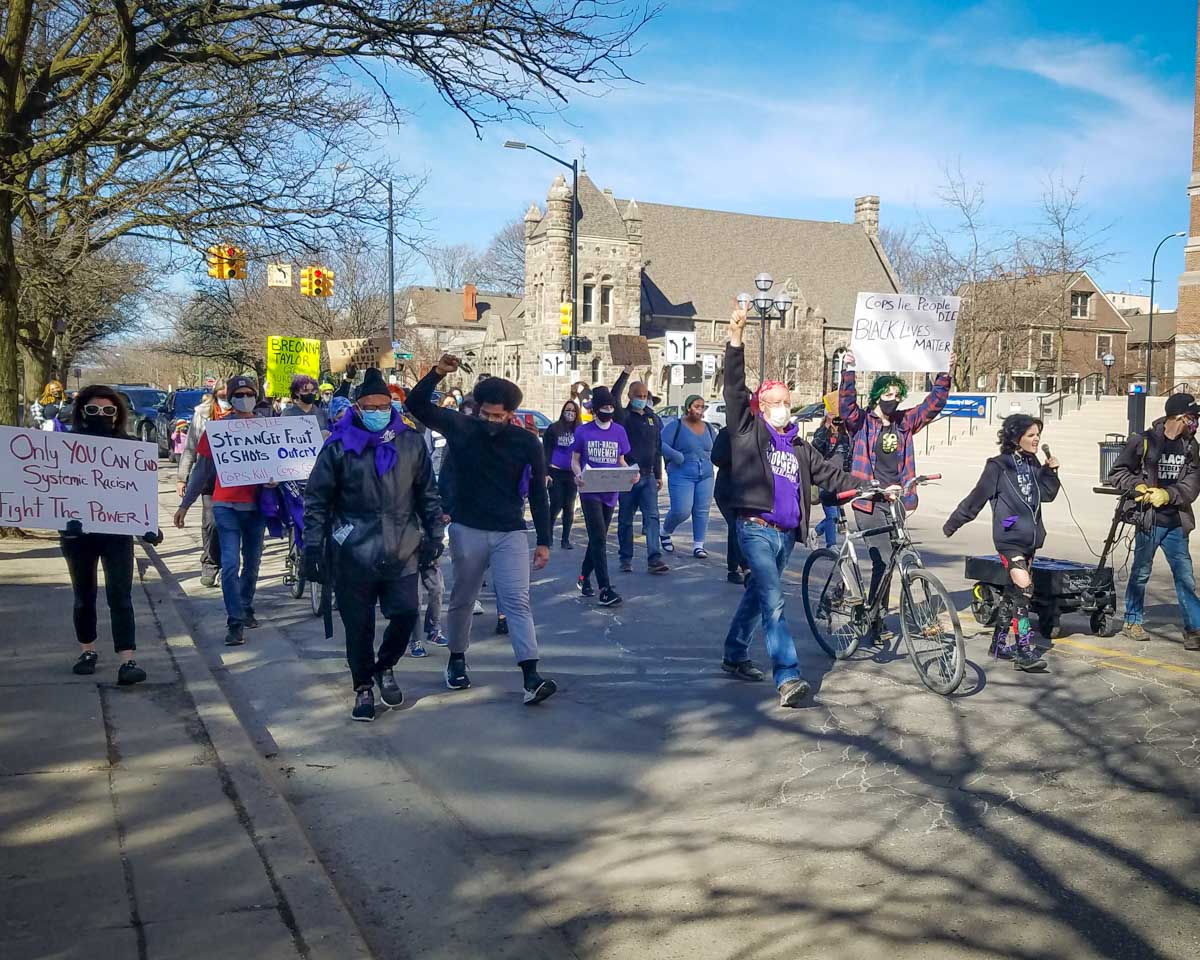
A sign on display at the protest.
Torrence Williams | Washtenaw Voice
by ELINOR EPPERSON
Staff Writer
A procession of a few dozen people blocked traffic in downtown Ann Arbor on Saturday, March 13 to protest racial inequality and encourage fellow residents to get involved.
About 50-60 people gathered at The Diag for a protest titled “Operation: Accountability,” where they listened to local activists and officials speak before marching down Main Street. A dozen speakers addressed the crowd about a wide range of issues, from discrimination in school to police oversight, with one theme in common: holding individuals and public officials accountable for racial equity.
“How many of you vote and go home?” asked Trisché Duckworth, the executive director of Survivors Speak, the nonprofit that organized the protest. The organization supports “survivors of injustice” and focuses on fighting racism.
In an interview before the protest, Duckworth emphasized that community members must “stay the course” after protesting to affect change. The goal of the protest is to “build momentum” and encourage community members to keep pushing for racial equity after a lull in late 2020. Duckworth envisions a “partnership between legislators and the community” that will keep the energy from marches going long after everyone has gone home.
“We have a tendency to get riled up,” but not follow through, she said. It will “take more than marching” to address racism and abuse of power, two issues at the center of the march. It is up to civilians, Duckworth says, to keep applying pressure to elected officials. The consequences of returning to “business as usual” are dire.
“Black and Brown people will continue to suffer the downward spiral of effects of white supremacy,” Duckworth said.
The first Black Lives Matter protest of 2021 in Washtenaw County marks both a new beginning for local activists and a resurgence of energy from last year. Though the protest was initially delayed due to inclement weather in February, Duckworth feels Saturday’s action was a success.
“People are more involved now than they ever were before,” she said. In June 2020 alone, more than 15 million people participated in Black Lives Matter protests across the country, according to the New York Times. Mass demonstrations erupted at the end of May 2020 in response to the police killings of George Floyd in Minneapolis and Breonna Taylor in Louisville, Kentucky.
While these incidents captured national attention, activists in Ann Arbor and Ypsilanti were also responding to one closer to home. Just days after Floyd’s death, cell phone footage surfaced of a Washtenaw County Sheriff’s Department officer punching a Ypsilanti Township resident in the head. Survivors Speak immediately took action.
Duckworth organized daily pickets of the Washtenaw County Sheriff’s Department offices on Hogback Road. Crowds at the protests swelled over the course of three days until approximately 300 protestors took to Washtenaw Avenue, marching more than a mile from the sheriff’s office past Arborland mall. A few days later, a June 6, 2020 protest in Ypsilanti (co-organized by Survivors Speak) drew over a thousand protestors.
But since last summer, public political action has waned. Multiple speakers noted that March 13 marked the one-year anniversary of Taylor’s death; as of this writing, no one has been charged with her killing. The officer responsible for Floyd’s death, Derek Chauvin, began his trial on March 8. And in response to the May 25 punching incident involving a WCSD deputy, Michigan Attorney General Dana Nessel’s office concluded that the officer’s actions were “justified and appropriate.”
Duckworth is unsure if there’s been any meaningful change locally since last summer, even after Washtenaw County Sheriff Jerry Clayton announced the creation of the 21st Century Policing Compliance Initiative and Commission in July 2020. She continues to plan marches to remind Ann Arbor and Ypsilanti why she is here.
Among those gathered on Saturday were several children, brought by their parents in strollers, on scooters, or on foot. Some attendees carried signs; virtually all were wearing masks. Between speakers, volunteers from Southeast Michigan Street Medics wiped down the mic and handed out hand sanitizer.
“I’m here to learn more,” said Taylor D., 20. She voted for Washtenaw County prosecutor Eli Savit and wants to stay informed on local efforts to combat racism.
Savit was present at the march as a speaker, along with Victoria Burton-Harris, Savit’s chief assistant prosecuting attorney. Since he took office in January, Savit has made headlines with announcements that his office will end cash bail, end charges for marijuana possession, and support expungements of previous marijuana convictions. Racial equity advocates such as Duckworth consider these changes a step in the right direction.
“That is the change I expect you to hold us accountable for,” Savit said at the rally.
Burton-Harris echoed his sentiments.
“Racism is baked into the very fabric of our society,” she said. “If you know better, do better.”

From left: Conviction Integrity and Expungement Unit Coordinator Frances Walters, Washtenaw County Chief Assistant Prosecuting Attorney Victoria Burton-Harris, Washtenaw County Prosecutor Eli Savit, event MC Valerie Kelley-Bonner.
Torrence Williams | Washtenaw Voice
Frances Walters, Washtenaw County Chief Assistant Prosecuting Attorney Victoria Burton-Harris, Washtenaw County Prosecutor Eli Savit, event MC Valerie Kelley-Bonner. ]
Local officials in attendance lined up at the front of the crowd to recite an “accountability pledge,” written by Survivors Speak. Led by Jasmine Bradford, an intern with Survivors Speak and social work student at the University of Michigan, the eight officials promised to “commit to the work of improving the treatment and well-being of Black communities and other underrepresented groups” and “keep relationship building with those in the community as a top priority towards equitable change for all.” Bradford led attendees in their own pledge as well, which emphasized “[being] proactive in the political processes that will impact my community.”

Washtenaw County officials read an “accountability pledge” before the gathered crowd.
Torrence Williams | Washtenaw Voice
The crowd walked from the Diag to William Street, taking a pre-planned route to Main Street. A pedicab carried participants unable to walk the distance. Duckworth invited attendees to the front of the crowd to the procession in chants.
Among the chants, Duckworth called for nearby motorists to “blow your horns for justice,” receiving a cacophony of honks in return. One motorist made a rude gesture towards the marchers before speeding off. Other onlookers took video with their phones or simply watched as the procession walked by.

Protesters march down State Street in Ann Arbor on Saturday, March 13.
Torrence Williams | Washtenaw Voice
Duckworth paused the march at the intersection of Huron Street and Main Street, adjacent to the Washtenaw County Courthouse. There, marchers held a moment of silence for victims of police brutality. Some marchers kneeled. AAPD officers monitored stopped traffic.
The march continued down Huron street, passing City Hall while chanting “value Black lives.” Then, the procession returned to the Diag.
“Please stay at the table,” Duckworth said, reminding attendees to keep pushing for change after the protest. She believes “everyone has talents to contribute,” and protesting is only one way to fight for change. Survivors Speak is hosting monthly Zoom discussions for anyone who wants to get involved. The next session is a volunteer open house, scheduled for Sunday, March 28 at 5 p.m.
“Each and every one of us is accountable to make the world better,” Duckworth said. For her, affecting change is a way of life. “The only thing I know how to do is fight.”


